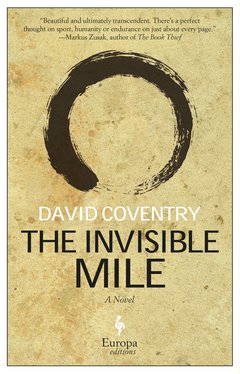David Coventry
The Invisible Mile
The book
A re-imagining of a true story, The Invisible Mile is a novel about the capacity of the human mind and body when stretched to their absolute limits, written in prose that calls to mind the works of Marilynne Robinson and John Banville, as well as Colson Whitehead’s National Book Award-winning novel The Underground Railroad.
In 1928, the Ravat-Wonder cycling team became the first English-speaking peloton to compete in the Tour de France. The riders, from faraway New Zealand and Australia, were treated as exotics and isolated from their surroundings by a thick barrier of language and culture. Underfinanced and undertrained, the team faced one of the toughest routes in the race’s history, 5,476 kilometers over unsealed roads through a landscape heavy with the legacy of the Great War. 162 cyclists began the race that year, only 42 finished.
A deeply introspective and spiritual book, The Invisible Mile is narrated by a fictional rider from the Ravat-Wonder team. Speaking no French and knowing a scant few of his fellow riders, his race becomes a confrontation with memories of the Great War and a quest to understand his own place amongst its history. He rides on the alternating highs of cocaine and opium, pain and pleasure, victory and defeat. And as he nears the northern battlefields and his last, invisible mile, trauma, exertion, and his personal demons take over. The Invisible Mile is the story of one man’s struggle for survival in the face of physical and psychological hardship, a profoundly human story about guilt and redemption.
The author
David Coventry
David Coventry’s critically acclaimed debut novel, The Invisible Mile, won the 2016 Hubert Church Award for Fiction in his native New Zealand and was a finalist for the prestigious Ockham New Zealand Book Award. Born in 1969, Coventry lives and writes on the side of a hill in Wellington.
Press
- Jun 22 2017
9 New Books We Recommend This Week
— The New York Times Book Review - Jun 16 2017
Debut Novels for Armchair Olympians, Rom-Com Fans, and More
— The New York Times Book Review - May 1 2017
“An introspective, philosophical look at the race.”
— Historical Novels Review - Apr 15 2017
“The remains of the war and memories of it hover over the story, as the riders complete superhuman rides, stoked on drugs of all sorts. ”
— Library Journal - Mar 28 2017
“...a powerful story of grim determination and one man’s forlorn hope to conquer fear and pain...”
— Publishers Weekly



